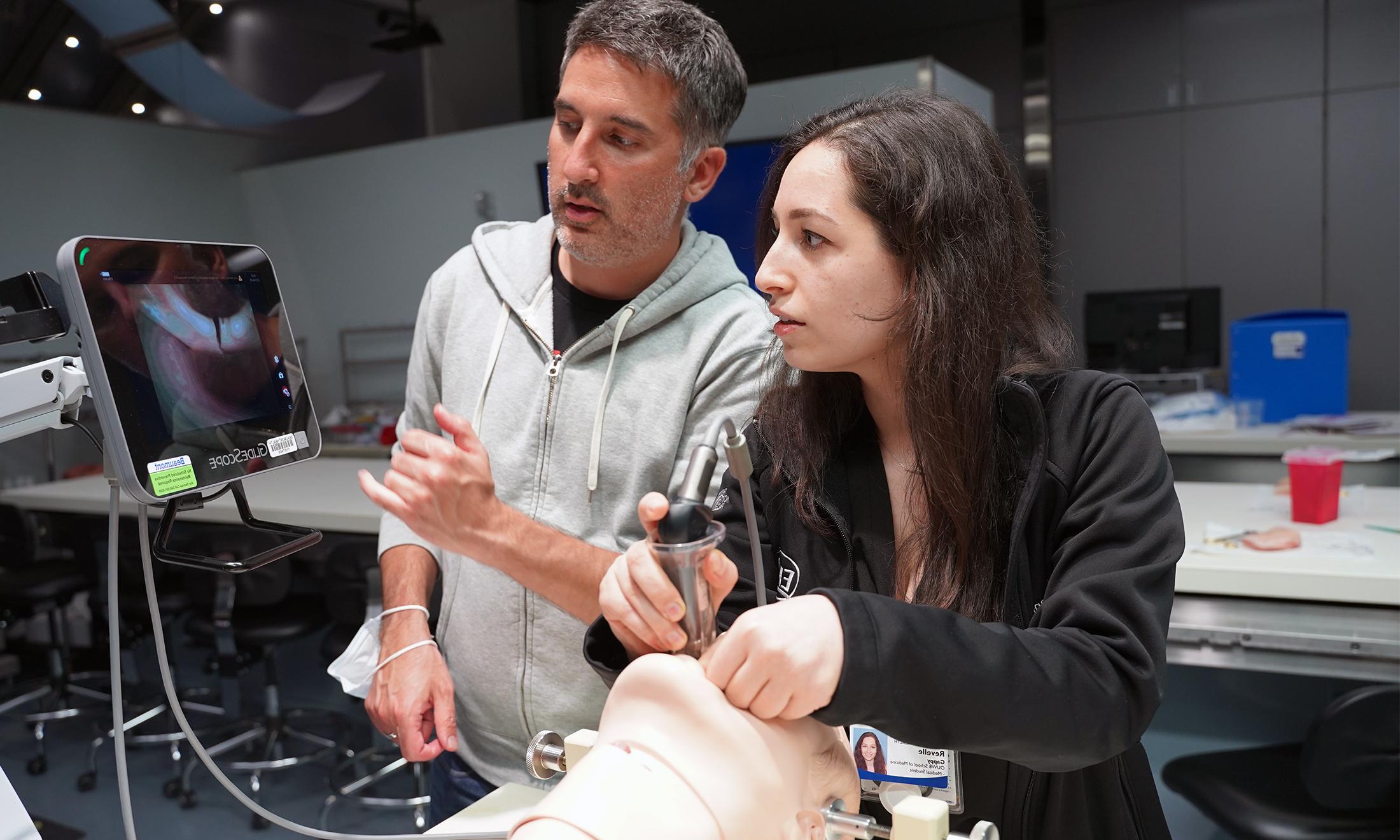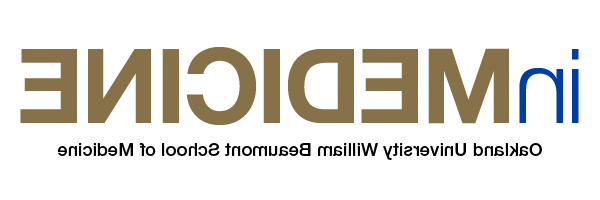‘Take on that initiative’
How and why OUWB med students seek leadership opportunities beyond the walls of O’Dowd Hall

雷夫尔有缺口的, M4, practices clinical skills during the Emergency Medicine Interest Group's Skills Night. 史蒂文·约瑟夫,M.D., clerkship director, Emergency Medicine, and EMIG faculty advisor, guides the session. Gappy is current chair for the Emergency Medicine Residents' Association (EMRA). (Photo by Andrew Dietderich)
From her first shift as an emergency room (ER) tech at Detroit Receiving Hospital, 雷夫尔有缺口的 knew she wanted to spend the rest of her life working in emergency medicine.
Still an undergrad at the time, she did as much research and outreach as possible. Gappy learned about organizations like the Emergency Medicine Residents’ Association (EMRA).
When the now-M4 started at OUWB, she didn’t stop. She got involved in EMRA events geared toward medical students, participated in EMRA’s mentorship program, networked with other medical students, and eventually became the Great Lakes Regional Representative for the EMRA Medical 学生 Council.
去年, she was named chair of the same body — representing the roughly 3,000 medical students across the U.S. 谁是EMRA的成员.
“A key part of being a physician is leadership,” says Gappy. “加, I have a keen interest in medical education as well as how the future standards of our field impact medical students, 居民, 等等.......”
“This perfectly aligns with my careers goals of wanting to go into medical education and have a key voice in these discussions,她补充道.
Gappy is among many OUWB students who have actively sought out leadership opportunities that extend well beyond the comfy confines of campus.
Some, like Gappy, do it on a national level. Others do it on a state or regional level.
However they seek out leadership positions, they’re gaining experience and building a skillset — and network — that many believe will one-day be imperative in their success as physicians.
伯克利布朗,博士.D., 副院长, 学生事务, 所说的, “students have the opportunity to network with academic medicine leaders… (and to) develop relationships with colleagues and potential mentors, and make significant contributions to the goals and direction of academic medicine for years to come.”

瑞安Ko, M4, (left) with other members of the NEXT Step 1 task force from University of Miami, University of Illinois - Chicago, 和范德比尔特大学.
NEXT Step 1 is a multi-institutional collaborative project to encourage new innovation in medical school curriculum, 学生建议, and residency applications now that USMLE Step 1 is pass/fail. The team has presented at several national conferences and meetings to give students and advisors a voice at the table when considering future changes to national medical education standards. (提交的图)
The importance of leadership
Several organizations emphasize the importance of medical students gaining leadership experience.
The Liaison Committee on Medical Education (LCME), which oversees accreditation of allopathic medical schools like OUWB in the U.S. and Canada, references leadership skills in multiple competencies that M.D. granting schools must fulfill to maintain accreditation.
The American Medical Association recently created the AMA Medical 学生 Leadership Learning Series, which focused on the importance of communication, conflict resolution, collaboration, and more.
"对于医科学生, being great at your coursework and understanding the science and ‘technical’ aspects of health care delivery are the table stakes,” 安·曼尼卡说, AMA director of organizational development and learning.
“The differentiator needed ‘to win’ is having great leadership skills.”
一个 系统性回顾, however, led by two OUWB alumni (and a professor) and published in the International Journal of Medical 学生s found that “most medical schools begin their leadership education in the first half of a student’s medical school tenure, but very few extended the curriculum for the entirety of medical school.”
由 马洛里埃文斯, M.D., 埃里克·詹姆斯, M.D. — both OUWB ’23 — and OUWB Professor Misa Mi, Ph.D., the review also found that “t在这里 is no set of leadership competencies or abilities that medical schools are required to develop in their students prior to graduation.”
简而言之, medical students need to proactively — and creatively — seek out leadership opportunities, according to those like M4 瑞安Ko. (Ko is an OUWB representative on the AAMC Organization of 学生 Representatives, serves on the NEXT Step 1 task force, and has served as a national delegate within the AAMC Executive Leadership Team.)
“When it comes to getting involved in extracurriculars, people tend to make the mistake of fitting into a pre-existing box,他说. “Some of the greatest innovation you can do as a student is something that is entirely your own. It doesn’t have to be through a student organization.”
例如, in the earliest days of the COVID-19 pandemic, Ko — along with Evans and Brandon Prentice, M4 -开发的 vaccine educational campaign that they delivered throughout southeast Michigan.
“We did that entirely on our own accord,” says Ko. “We did all the work ourselves. It’s an example of how leadership doesn’t have to fit within the confines of what you imagine is OK or not. It’s a matter of asking around until you’re able to get things done.”
“You just have to take on that initiative,” he adds.
 |
| Ko gave a plenary talk on NEXT Step 1 at an AAMC conference in 2023. (提交的图) |
“独一无二的机会”
AAMC’s Organization of 学生 Representatives represent medical students nationwide and provides an active role in advancing the AAMC mission to improve the nation’s health.
OSR representatives tackle initiatives ranging from improved access to third-party resources used for USMLE prep to overall improvements in medical education. The representatives then work with administrators at their respective schools to implement change, 在适当的地方.
举个例子, OSRs have advocated increased use of resources that show how diseases present differently on a wide range of skin tones. 在另一个例子中, OSR representatives are working on development of different medical language electives for M4s.
At OUWB, one student from each current class serves as an OSR representative. (See all OUWB Medical School Government participants 在这里.)
Riya Chhabra, M2, represents the OUWB Class of 2026.
“It’s appealing (to be an OSR rep) because it’s really cool to be able to work on medical education initiatives at the school level, and then also at the national level,查布拉说.
OSRs representatives apply for the position and are then interviewed by those who served in the previous year.
Most of the work done with OSRs from other schools is done virtually, but they do have the opportunity to attend an annual conference held in person. (Travel expenses generally are covered by each respective participating school.)
In addition to discussing potential policy and other changes, Chhabra says being involved in AAMC at a national level provides other benefits.
“It’s great to meet students from all across the nation and really see how their medical schools are doing regarding certain things like curriculum or diversity,她说。. “Forming these relationships is cool and exciting.”
Shivapriya Chandu, M1, and OSR rep for the Class of 2027, calls it an amazing role.
Chandu says she learned about the opportunity to potentially be an OSR before she started medical school. 主要诉求, 她说, was having the chance to affect change w在这里 it’s believed to be needed most.
“It can be surprising when you see how much of an impact an idea can have, especially when it comes from students,她说。.
It’s comments like those that has Browne saying that being an OSR representative is a great opportunity.
“(They) get a unique opportunity to represent OUWB students to a national audience, have the chance to put OUWB's programs, 政策, and support services in perspective relative to their peers, and also gain insight into academic medicine at a much larger scale than their individual experience at our school,布朗说。.

 2月. 1, 2024
2月. 1, 2024 作者:Andrew Dietderich
作者:Andrew Dietderich

